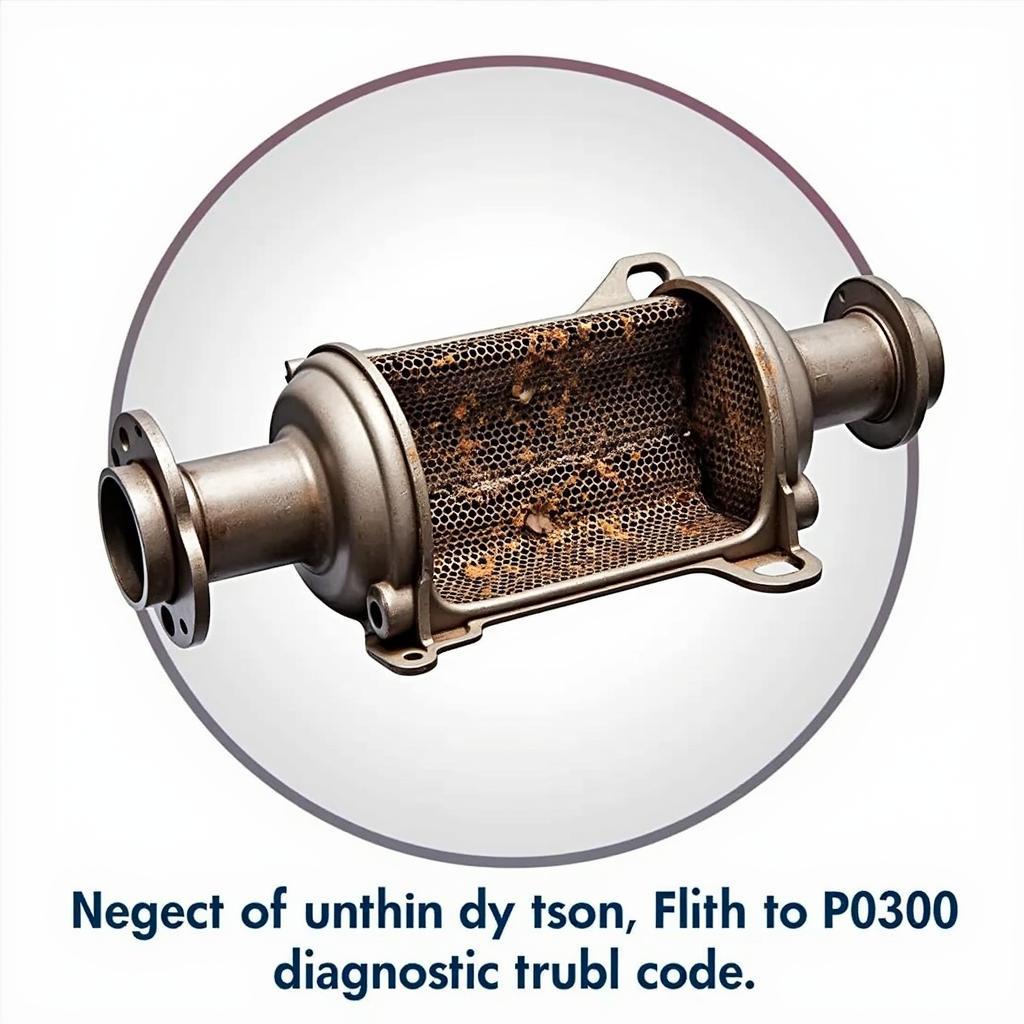Your cart is currently empty!

Deciphering the Dreaded Fault Code P0300 in Your Audi
The dreaded fault code p0300 on your Audi dashboard can be a real head-scratcher. This generic OBD-II code indicates a random or multiple cylinder misfire, meaning your engine isn’t firing smoothly across all cylinders. This can lead to decreased performance, rough idling, and even increased emissions. But fear not! This guide will walk you through understanding, diagnosing, and hopefully resolving this common Audi issue.
You can find more information regarding Audi fault codes at audi obd fault code p0300.
What Does P0300 Really Mean?
The P0300 code signifies a random misfire. Unlike codes like P0301 (misfire cylinder 1), P0300 doesn’t pinpoint a specific cylinder. This makes the diagnostic process a bit more involved, requiring a systematic approach to identify the root cause. This could range from something as simple as a worn spark plug to more complex issues like a faulty ignition coil or even a vacuum leak.
Common Causes of P0300 in Audis
Several culprits can trigger the P0300 code in your Audi. These include:
- Worn Spark Plugs: Spark plugs are essential for igniting the air-fuel mixture in the cylinders. Over time, they wear out, leading to inefficient combustion and misfires.
- Faulty Ignition Coils: Ignition coils provide the high voltage necessary for the spark plugs to fire. A failing coil can prevent a cylinder from firing properly.
- Vacuum Leaks: Leaks in the intake manifold or vacuum hoses can disrupt the air-fuel mixture, causing misfires.
- Fuel Injectors: Clogged or malfunctioning fuel injectors can disrupt the fuel delivery to the cylinders, leading to an imbalance in the air-fuel mixture and misfires.
- Oxygen Sensors: While not a direct cause, faulty oxygen sensors can provide incorrect data to the engine control unit (ECU), leading to improper fuel mixture adjustments and potentially misfires.
 Worn spark plugs causing P0300 fault code in Audi
Worn spark plugs causing P0300 fault code in Audi
Diagnosing the P0300 Code
Diagnosing the P0300 code involves a methodical approach. Here’s a step-by-step guide:
- Check for other codes: Sometimes, P0300 accompanies other codes that may provide further clues. Make sure to check for any additional fault codes using an OBD-II scanner.
- Inspect Spark Plugs and Wires: Visually inspect the spark plugs for wear and damage. Also, check the spark plug wires for cracks or damage.
- Test Ignition Coils: A multimeter can be used to test the resistance of the ignition coils. Compare the readings with the manufacturer’s specifications.
- Check for Vacuum Leaks: Use a vacuum gauge or a smoke test to detect any leaks in the intake manifold or vacuum hoses.
- Inspect Fuel Injectors: A fuel pressure test and injector flow test can help determine if the fuel injectors are functioning correctly.
- Check Oxygen Sensors: Test the oxygen sensors using a multimeter or an oscilloscope to ensure they are providing accurate readings.
Check out more about Audi A4 fault codes at audi a4 fault codes.
 Checking for vacuum leaks in an Audi engine bay
Checking for vacuum leaks in an Audi engine bay
Solving the P0300 Problem
Once you’ve identified the root cause, you can take appropriate action. This might involve replacing worn spark plugs, faulty ignition coils, or repairing vacuum leaks. In some cases, a simple fuel system cleaning might resolve the issue. For more complex problems, professional assistance may be necessary.
“When diagnosing a P0300, it’s crucial to remember that it’s a symptom, not the problem itself. Thorough inspection and testing are key to finding the underlying cause,” says Robert Miller, a veteran automotive technician with over 20 years of experience.
If you are looking for a reliable Audi code reader, you can find helpful information at best audi code reader.
Why is Addressing P0300 Important?
Ignoring a P0300 code can lead to further damage and costly repairs down the line. Continued misfires can damage the catalytic converter, decrease fuel efficiency, and ultimately lead to engine failure.
 Damaged catalytic converter due to ignored P0300 code in Audi
Damaged catalytic converter due to ignored P0300 code in Audi
Conclusion
The fault code p0300 in your Audi can be daunting, but with a systematic approach to diagnosis and repair, you can get your car running smoothly again. Don’t let this code linger; address it promptly to prevent further damage and maintain optimal performance. Remember, early diagnosis and intervention can save you time, money, and frustration in the long run. Need further assistance? Connect with us at VCDSTOOL at +1 (641) 206-8880 and our email address: vcdstool@gmail.com or visit our office at 6719 W 70th Ave, Arvada, CO 80003, USA. We specialize in helping drivers and technicians resolve complex automotive issues. More information on Ross-Tech Audi codes can be found at ross tech audi codes.
“Remember, the sooner you address the p0300 code, the less likely you are to encounter more serious and expensive problems down the road,” adds Sarah Chen, a certified Audi technician and diagnostics specialist. You can also find resources about the 2001 Audi A6 2.8 engine code at 2001 audi a6 2.8 engine code.
by
Tags:
Leave a Reply